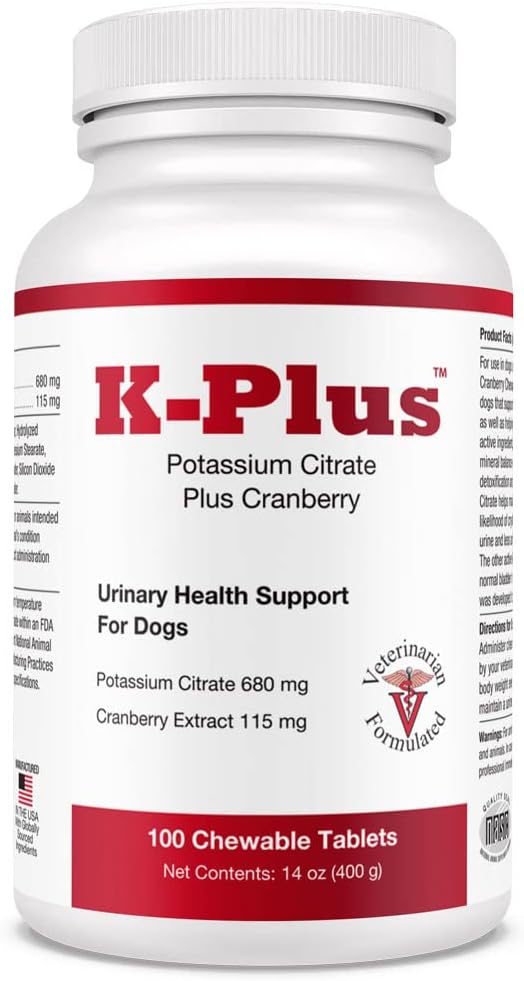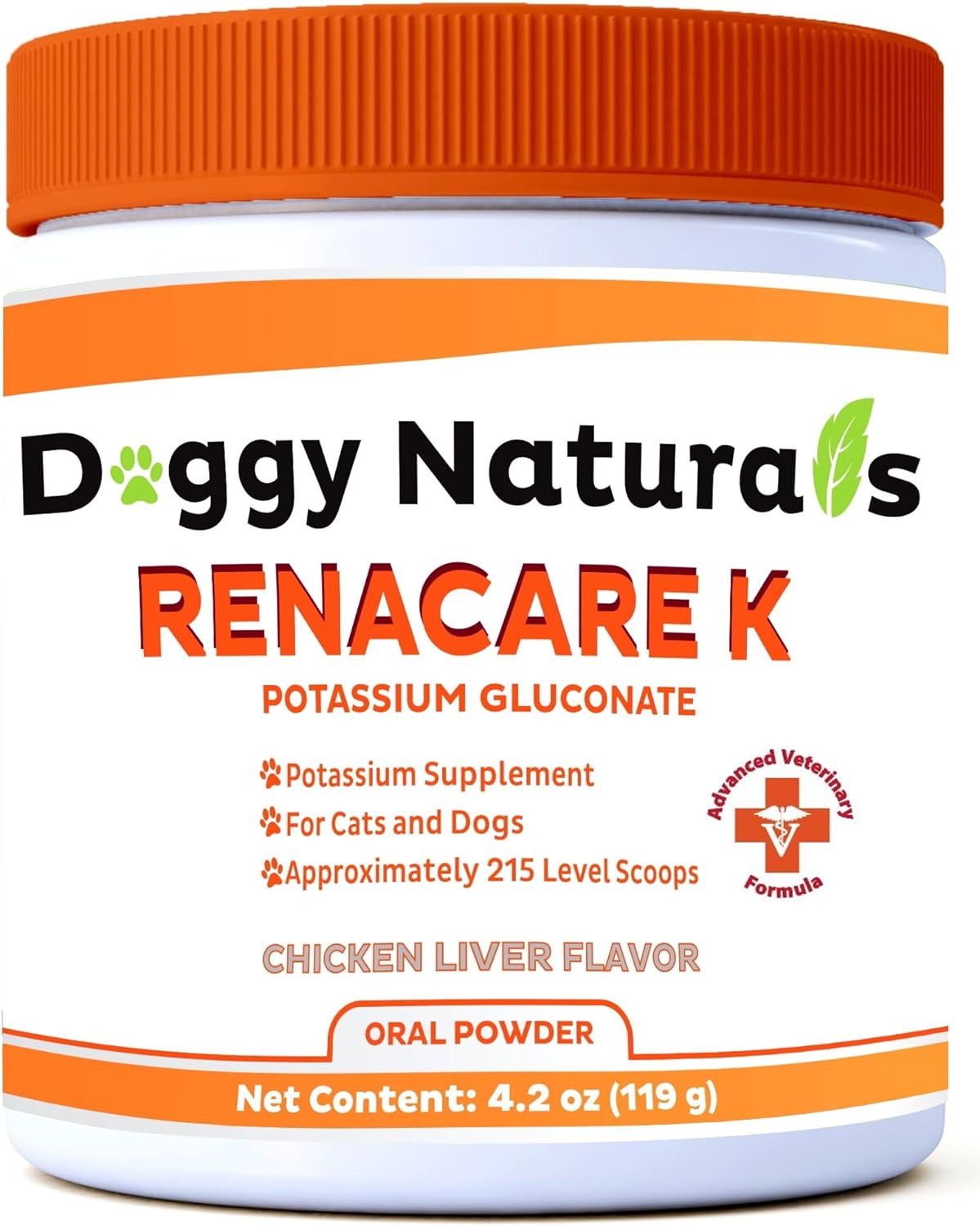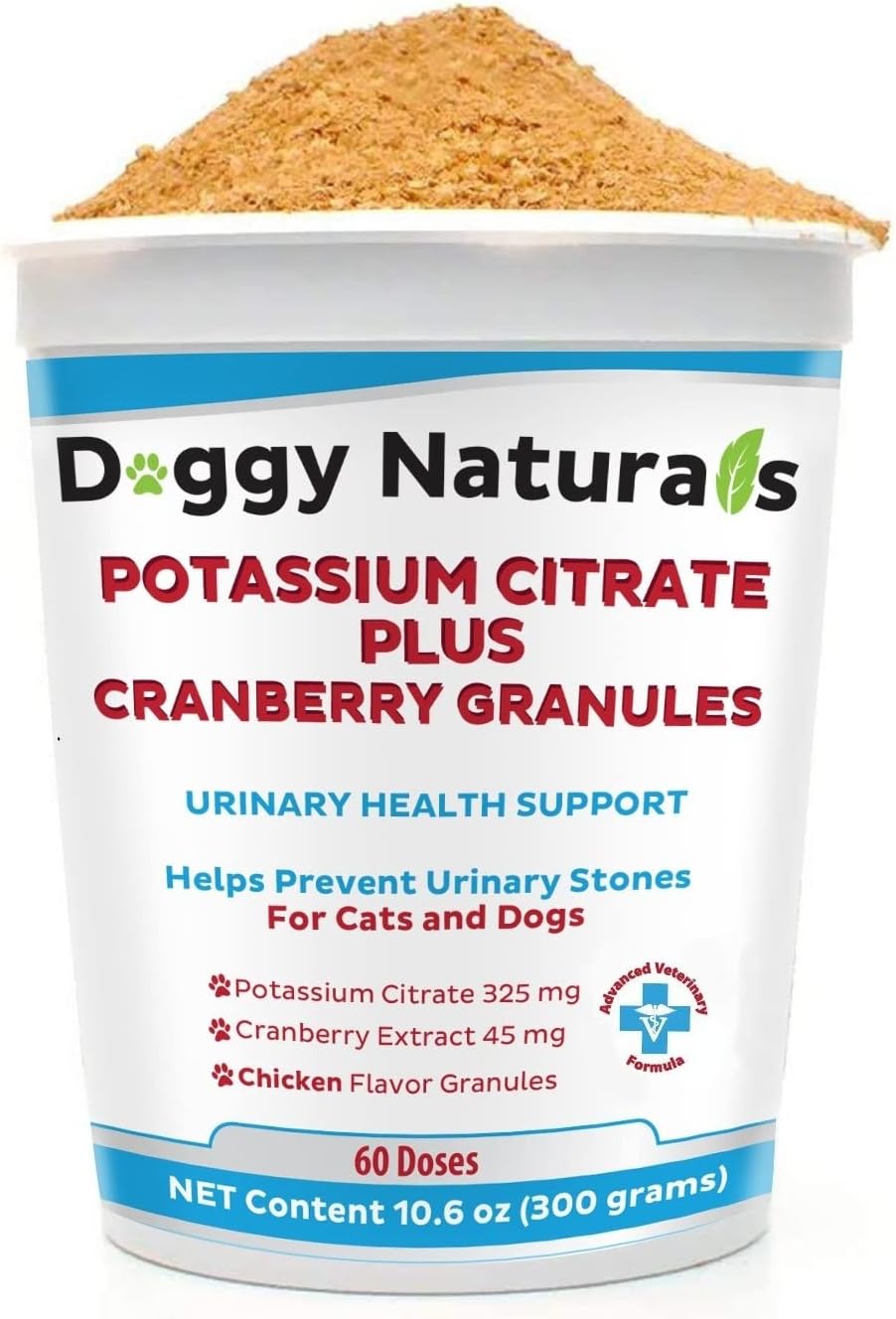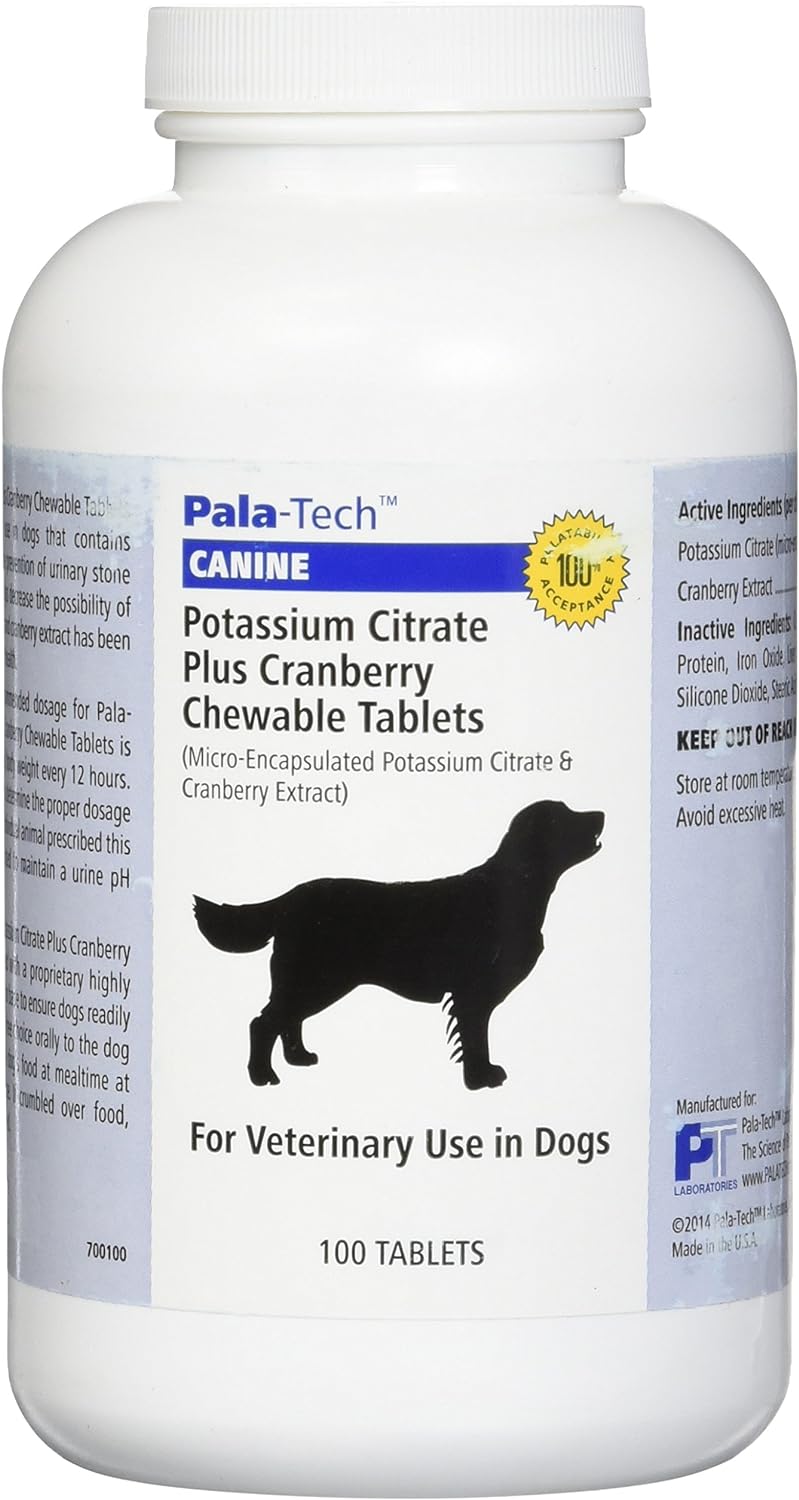iHeartDogs is reader-supported. When you buy via links on our site, we may earn an affiliate commission at no extra cost to you.
Potassium supplements for dogs have become an essential topic of discussion among dog parents, given the pivotal role of potassium in canine health. In this comprehensive guide, we’ll explore everything from the importance of potassium in maintaining the well-being of our four-legged friends to the tell-tale signs of potassium imbalances.
Additionally, for those considering introducing potassium-rich foods or supplements to their pets, we provide essential guidance and precautions. And because quality matters, we’ll also present carefully vetted reviews of the best potassium supplements available, ensuring your dog gets optimal care and nutrition.
Before we get to the skinny on potassium for dogs, tough, it’s essential to understand that inappropriate use of potassium supplements can lead to hyperkalemia (elevated potassium levels), which can be just as dangerous, if not more so, than hypokalemia. Both conditions can lead to severe cardiac issues among other complications.
If you suspect that your dog may need potassium supplements or if you’ve noticed symptoms like muscle weakness, lethargy, difficulty walking, or an abnormal heart rhythm, you should consult with a veterinarian. They will be able to conduct blood tests to determine your dog’s potassium levels and recommend appropriate treatment.
Always use potassium supplements under the guidance of a veterinarian and never self-prescribe, as the wrong dosage or inappropriate use can be harmful or fatal.
Does Your Dog Need A Potassium Supplement?
Potassium supplements for dogs are primarily used to address or prevent hypokalemia (low potassium levels). Potassium is a vital electrolyte that supports several critical functions in the body. When administered correctly and for the right reasons, potassium supplements can help with the following in dogs:
- Muscle Function: Potassium is essential for muscle contraction. Dogs with potassium deficiency might exhibit symptoms like muscle weakness, tremors, or even paralysis.
- Nerve Function: Potassium plays a vital role in nerve cell function, ensuring proper nerve impulse transmission. A deficiency can lead to neurological issues.
- Acid-Base Balance: Potassium helps maintain the body’s pH level, ensuring that it doesn’t become too acidic or too alkaline.
- Enzymatic Reactions: Many enzymatic reactions in the body require potassium.
- Fluid Balance: Potassium assists in regulating the body’s intracellular and extracellular fluid levels.
- Heart Health: Proper potassium levels are crucial for maintaining the heart’s electrical activity. Abnormal potassium levels, either too high or too low, can lead to life-threatening cardiac arrhythmias.
Specific scenarios where potassium supplements might be beneficial for dogs include:
- Chronic Renal (Kidney) Disease: One of the functions of the kidneys is to balance potassium levels in the body. Dogs with kidney disease may lose excessive potassium in their urine, leading to hypokalemia.
- Use of Specific Medications: Some drugs, especially diuretics, can lead to increased potassium excretion.
- Gastrointestinal Issues: Conditions causing chronic vomiting or diarrhea can lead to loss of potassium.
- Metabolic Disorders: Some metabolic disorders can alter the body’s potassium balance.
- Certain Diseases: Diseases like Addison’s disease can lead to abnormalities in potassium levels.
As always, it’s essential to consult with a veterinarian before starting a dog on potassium supplements. Inappropriate supplementation can lead to dangerous imbalances, even if given with the best of intentions.
Are Potassium Supplements for Dogs Safe?
Potassium supplements can be safe for dogs when used appropriately and under the guidance of a veterinarian. They are commonly prescribed for dogs with specific medical conditions or needs, such as chronic kidney disease, certain metabolic disorders, or when taking medications that can lead to potassium loss.
However, several key points should be considered to ensure the safe use of potassium supplements in dogs:
- Correct Diagnosis: The primary reason to use potassium supplements is to treat or prevent hypokalemia (low blood potassium levels). A confirmed diagnosis based on blood tests and clinical signs is essential before starting supplementation.
- Dose and Duration: Giving the correct dose for the specific dog and condition is crucial. Overdosing can lead to hyperkalemia (elevated blood potassium levels), which is dangerous and can lead to cardiac issues. The duration of supplementation also matters; it should not be given longer than necessary.
- Monitor Blood Levels: Regular blood tests are vital when a dog is on potassium supplements. This monitoring ensures that the potassium levels remain within the safe and desired range.
- Look Out for Side Effects: While potassium supplements are generally well-tolerated, some dogs might experience gastrointestinal upset, including vomiting or diarrhea. If a dog exhibits any side effects or adverse reactions, it’s essential to consult with the veterinarian immediately.
- Avoid Human Supplements: Some dog owners might be tempted to give their pets human potassium supplements. However, the dosing and formulation might not be appropriate for dogs, potentially leading to overdose or other issues. Always use a product specifically formulated for dogs or one that the veterinarian prescribes.
- Other Medications and Interactions: Some medications can interact with potassium supplements, altering the dog’s potassium levels or the efficacy of the other drug. It’s essential to inform the veterinarian of all medications and supplements the dog is taking.
- Avoid Self-Diagnosis and Treatment: Even if a dog exhibits signs consistent with low potassium, other conditions can produce similar symptoms. It’s crucial to get a veterinarian’s opinion rather than attempting to diagnose and treat the issue at home.
Potassium supplements can be safe and beneficial for dogs with specific needs or conditions. However, they should always be used with caution, under veterinary supervision, and with regular monitoring.
Buyer’s Guide: What To Consider When Buying Potassium Supplements for Dogs
If you’re considering purchasing potassium supplements for your dog, consider these factors to make an informed decision:
- Veterinarian Recommendation: Before starting any supplement, always consult with a veterinarian. They can determine if your dog truly has a potassium deficiency and provide guidance on the appropriate type, dosage, and frequency.
- Formulation: Potassium supplements come in various forms such as oral tablets, powders, gels, and injectibles. The ideal formulation will depend on your dog’s specific needs and preferences.
- Dosage: The amount of potassium in each supplement can vary. It’s crucial to choose a product that allows for easy and accurate dosing, especially for smaller dogs where slight variations can make a significant difference.
- Ingredients: Check the label for any additional ingredients. Some supplements might contain added flavors or other components to make them more palatable. Ensure your dog isn’t allergic to any of these ingredients.
- Absorbability: Some potassium formulations may be more bioavailable than others. It’s a good idea to discuss with your veterinarian which type is best suited for your dog’s needs.
- Brand Reputation: Choose a reputable brand known for its quality control and safety standards. Research or ask your vet for recommendations.
- Interactions: If your dog is on other medications, consult with your veterinarian to ensure there are no adverse interactions with the potassium supplement.
- Feedback and Reviews: Look for feedback or reviews from other dog owners who’ve used the product. Their experiences might provide additional insights.
Remember, it’s essential to monitor your dog closely after starting any new supplement and report any unusual reactions or symptoms to your veterinarian. Regular blood tests may also be recommended by your vet to ensure that potassium levels remain within the desired range.
The 5 Best Potassium Supplements For Dogs
#1 – Vetoquinol Renal K+ (Potassium Gluconate) Potassium Supplement Gel for Dogs and Cats
Vetoquinol Renal K+ (Potassium Gluconate) Potassium Supplement Gel for Dogs and Cats stands out as a highly effective product tailored to address potassium imbalances in our pets. The 5oz packaging is convenient, ensuring that pet parents have a sufficient supply for regular dosing. What’s particularly commendable is its gel formulation, making it easier for pet owners to administer, either directly or mixed with food. Suitable for both dogs and cats, this versatile supplement underscores Vetoquinol’s commitment to producing high-quality pet healthcare products. The palatability is another bonus, with many pets taking to the taste without any fuss. Overall, for those in search of a reliable potassium supplement, Vetoquinol Renal K+ is certainly worth considering.
Pros:
- Easy to mix with food or administer directly
- Versatile use for different pet types
- Generally well-received taste by pets
Cons:
- Gel consistency might not be preferred by all pet parents
#2 – K-Plus Potassium Citrate Plus Cranberry Supplement for Dogs
The K-Plus Potassium Citrate Plus Cranberry Supplement is a thoughtful blend designed to serve dual purposes: address potassium requirements and support bladder health. These chewable tablets are not only effective but also convenient, making the supplementation process less cumbersome for dog owners. One unique feature is the integration of cranberry, which is known to be beneficial for urinary tract health. With a dosage suitable for every dog breed, it’s a versatile choice.
Pros:
- Dual benefit of potassium supplementation and UTI prevention
- Chewable format for easy administration
- Versatile for every breed
- Also available in gel and granules
Cons:
- Some dogs may not be immediately receptive to the flavor
#3 – Doggy Naturals RenaCare K is for Renal K (Potassium Gluconate) Potassium Supplement Powder
Doggy Naturals RenaCare K offers a uniquely formulated powder supplement to address potassium imbalances in both dogs and cats. The 4 oz packaging comes with a chicken liver flavor, making it an enticing option for pets. The inclusion of a level scoop ensures accuracy in dosage. What’s noteworthy is its adaptability; the powder can easily be mixed with food, ensuring no disruption in your dog’s usual feeding habits. Being made in the U.S.A adds to the assurance of quality. Its versatility and taste make it a strong contender in the market.
Pros:
- Easily mixes with regular food
- Palatable flavor enhances acceptance
- Versatile for both dogs and cats
Cons:
- Measuring scoop might seem small for larger breeds
#4 – Doggy Naturals Potassium Citrate Plus Cranberry Granules
Tackling both potassium needs and urinary tract issues, Doggy Naturals Potassium Citrate Plus Cranberry Granules offer a dual-action approach to pet health. The 300gm packaging ensures a generous supply, while the granular consistency makes mixing with food straightforward. The cranberry element not only deters the formation of calcium oxalate stones but also promotes overall bladder and kidney health. Manufactured in the U.S.A, this product meets high-quality standards. It’s suitable for both cats and dogs, emphasizing its adaptability. The focus on urinary tract support positions it as a comprehensive solution for pet parents.
Pros:
- Comprehensive urinary tract support
- Yummy chicken flavor
- Easily integrates with regular food
- Quality assurance with U.S.A manufacturing
Cons:
- Granular texture might not be preferred by all pets
- Some pets may require an adjustment period to accept the new addition to their food
#5 – Pala Tech Potassium Citrate Plus Cranberry
Pala Tech brings forth a blend that’s both beneficial for potassium supplementation and urinary tract health. Their chewable tablets are not only functional but also designed for easy ingestion by pets. The incorporation of cranberry reinforces bladder health, acting as a preventive measure against UTIs. With a count of 100 tablets, it provides ample dosage for consistent use. The chewable nature ensures that administration isn’t a hassle, even for finicky pets. Overall, this product offers a balance of health benefits and convenience.
Pros:
- Dual action for potassium balance and urinary health
- Easy-to-administer chewable format
- Contains no animal proteins
Cons:
- Flavor might not be universally appealing
- Tablets might be too large for smaller breeds to consume directly
FAQs About Potassium for Dogs
Why is potassium important for dogs?
Potassium is a crucial electrolyte for dogs that plays a fundamental role in maintaining several physiological processes. It aids in nerve transmission, ensuring signals travel appropriately between the brain and the body. Additionally, potassium supports muscle contractions, allowing for smooth movement and activity. Furthermore, it assists in maintaining proper fluid balance within cells and contributes to the regular function of enzymes and the overall acid-base balance in the body. Without the right levels of potassium, a dog’s health can be adversely affected.
What are the signs of potassium deficiency in dogs?
Potassium deficiency, known as hypokalemia, can manifest in several ways in dogs. Common symptoms include muscle weakness, where the dog might appear lethargic or have difficulty moving around. Some dogs may exhibit muscle twitching or tremors. In severe cases, a dog could experience episodes of paralysis. Additionally, due to the influence of potassium on cardiac muscles, hypokalemia can also lead to abnormal heart rhythms. If any of these signs are noticed, it’s essential to consult with a veterinarian.
Can dogs eat foods high in potassium, like bananas?
Yes, dogs can eat potassium-rich foods like bananas in moderation. Bananas are generally safe for dogs and can serve as a nutritious treat. However, like with any human food given to dogs, it’s essential to ensure that the portion is appropriate for the dog’s size and overall dietary needs. Too much of anything, even healthy foods, can cause imbalances or digestive issues. Always ensure that the banana is peeled and avoid giving the dog any part of the banana plant, as these can be harmful.
What foods are high in potassium that I can feed my dog?
Several foods are naturally rich in potassium that can be safely introduced to a dog’s diet. Aside from bananas, other potassium-rich foods include sweet potatoes, oranges, fish like salmon, and beans. When introducing these foods, ensure they’re free from added seasonings, sugars, or other ingredients that might be harmful to dogs. Always start with small amounts to gauge your dog’s reaction and ensure they don’t have any allergies or intolerances.
What causes high potassium in dogs?
High potassium levels in dogs, known as hyperkalemia, can arise from several causes. Reduced kidney function is a primary contributor, as the kidneys play a crucial role in regulating potassium excretion. Urinary tract obstructions can also lead to elevated potassium levels. Other causes include adrenal gland disorders (like Addison’s disease), traumatic injuries that involve muscle damage, certain medications, and ingestion of excessive amounts of potassium. If hyperkalemia is suspected, seek veterinary attention promptly, as elevated potassium can lead to serious health complications.
How can I tell if my dog has high potassium levels (hyperkalemia)?
Recognizing hyperkalemia in dogs can be challenging as the symptoms might be subtle or resemble other conditions. Common indicators include weakness, particularly in the hind legs, lethargy, and a slow or irregular heartbeat. In more severe cases, dogs might collapse or experience cardiac arrest. Additionally, changes in urination habits, such as reduced urine output, can hint at hyperkalemia, especially when combined with other symptoms. It’s essential to understand that the only definitive way to diagnose hyperkalemia is through a blood test conducted by a veterinarian.
What causes low potassium levels (hypokalemia) in dogs?
Several factors can lead to hypokalemia in dogs. Chronic kidney disease is a common cause, as affected kidneys can excrete excessive amounts of potassium in the urine. Other potential causes include prolonged episodes of vomiting or diarrhea, which result in the loss of significant potassium. Some medications, especially diuretics, can promote the excretion of potassium. Additionally, specific metabolic disorders, poor diet, or conditions that disrupt nutrient absorption from the intestines can also result in lowered potassium levels.
Is it safe to give human potassium supplements to my dog?
Administering human potassium supplements to dogs without veterinary guidance is not recommended. While potassium is essential for dogs, the dosage and type suitable for humans might not be appropriate for canine consumption. Giving the wrong amount or form of potassium can lead to imbalances, potentially causing adverse health effects. If you suspect your dog might benefit from potassium supplementation, consult with a veterinarian to ensure the correct type, dosage, and administration frequency.
How are potassium imbalances treated in dogs?
Treating potassium imbalances in dogs depends on whether there’s a deficiency or an excess and the underlying cause. For hypokalemia (low potassium), oral or injectable potassium supplements may be prescribed. Dietary adjustments, like adding potassium-rich foods, can also help. For hyperkalemia (high potassium), the treatment often revolves around addressing the underlying cause, such as kidney disease or a urinary obstruction. Intravenous fluids, certain medications, or specific interventions (like dialysis in severe kidney failure cases) might be required. Regular monitoring through blood tests is crucial to track potassium levels and adjust treatments accordingly.
Can diuretics affect my dog’s potassium levels?
Yes, diuretics can indeed influence a dog’s potassium levels. Diuretics, often referred to as “water pills,” increase the production and excretion of urine. While they help remove excess fluid from the body, they can also lead to the loss of important electrolytes, including potassium. There are different classes of diuretics, and some, known as “potassium-sparing” diuretics, are designed to minimize the loss of potassium. However, others can cause significant potassium loss, potentially leading to hypokalemia. Whenever a dog is prescribed diuretics, it’s essential to monitor its potassium levels and be aware of signs of an imbalance.
How often should my dog’s potassium levels be checked?
The frequency with which a dog’s potassium levels should be checked varies based on individual circumstances. For healthy dogs on a balanced diet with no health concerns, routine annual or bi-annual veterinary check-ups may suffice. However, dogs with conditions that can affect potassium levels (like kidney disease) or those on medications that influence potassium (like diuretics) might need more frequent monitoring. In such cases, a veterinarian may recommend blood tests every few weeks to every few months, depending on the specific situation and the dog’s overall health. Always consult with a veterinarian to establish the appropriate testing frequency for your pup.
Final Thoughts
In the realm of canine health, understanding and addressing the intricacies of potassium levels is paramount. As responsible pet parents, it’s our duty to stay informed and make choices that best promote our furry friends’ well-being. By leveraging quality potassium supplements and keeping a watchful eye on dietary needs, we ensure that our dogs lead not only a happy but also a balanced and healthy life.










 Toledo, United States.
Toledo, United States.